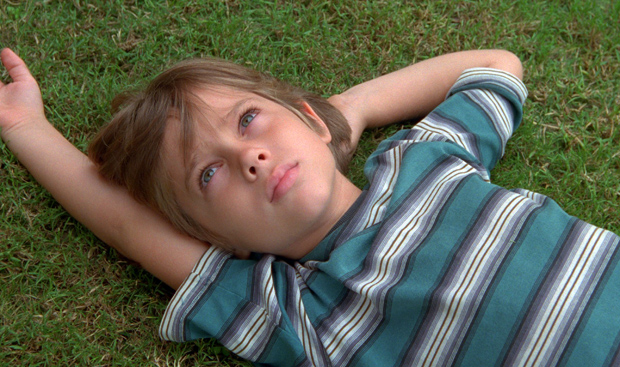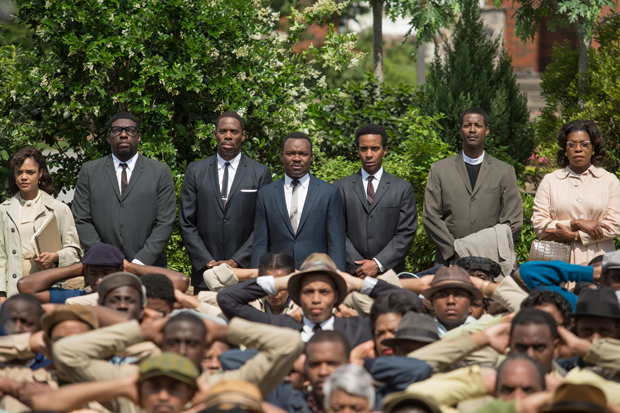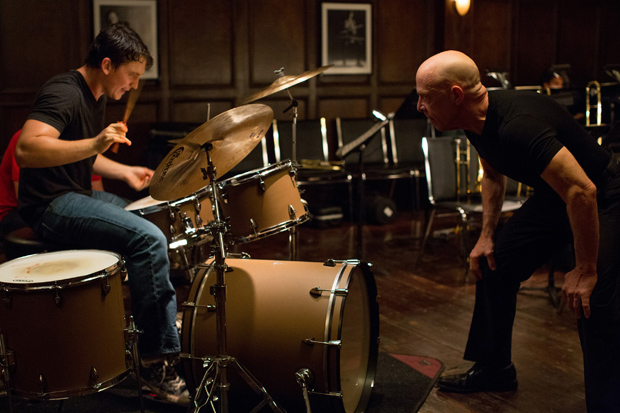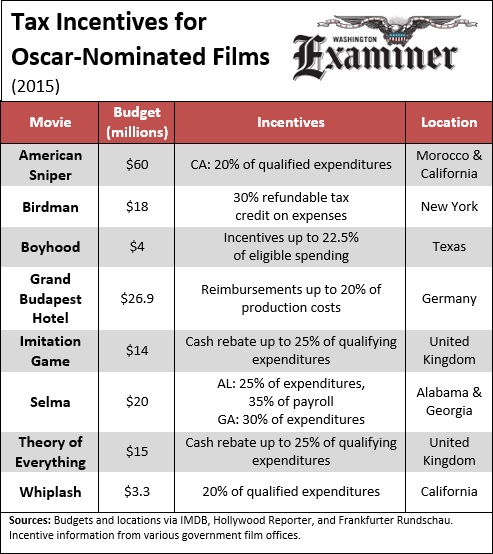Hollywood studios don’t fit most Americans’ definitions of needy, but all eight films nominated for Best Picture at the Oscars on Thursday qualified for generous government handouts. That’s because each of them were filmed in locations that give special tax breaks to movie makers. These tax breaks boost the number of movies made in the state, but there is scant evidence the breaks boost the economy or create jobs. Here’s a run-down of what each film was able to receive.
American Sniper

(AP Photo/Warner Bros.)
“American Sniper” received a $6.8 million tax credit from California, more than any other Best Picture nominee could have been eligible for. This tax credit is larger than the entire production budgets of two other films nominated for Best Picture: “Whiplash” and “Boyhood.” “American Sniper” also filmed on location in Morocco, which cuts productions costs by lowering its VAT rate by 20 percent. The Moroccan government also simplifies its import procedures and grants flight discounts to filmmakers. “Morocco has a reputation for offering help from its military — even sanctioning the use of tanks, helicopters and aircraft in battle scenes,” according to KFTV.
Birdman

(AP Photo/Fox Searchlight)
“Birdman,” which had a production budget of $18 million, may have been eligible for refundable credits of up to $5.4 million from the New York State Film Tax Credit Program. The program spends up to $420 million a year on fully refundable tax credits of 30 percent on qualified production and post-production costs. The movie also would have been eligible for marketing credits from New York City.
Boyhood

(AP Photo/IFC Films)
“Boyhood” was filmed in the Lone Star State, where the Texas Film Commission gives qualifying productions an incentive payment equal to 22.5 percent of spending inside the state, so “Boyhood” could have received a credit up to $900,000 on its $4 million budget.
Selma

(AP Photo/Paramount Pictures)
“Selma” spent only five days filming in Alabama, but it received a $637,000 tax rebate from the Alabama Film Office. The rest of the movie was filmed in Georgia, which requires only $500,000 of spending to be eligible for a 20 percent transferable tax credit. Depending on what portion of its $20 million budget was spent in Georgia, the film could have earned up to $4 million from the Georgia Film, Music & Digital Entertainment Office.
The Imitation Game

(AP Photo/Weinstein Company)
“The Imitation Game” was filmed in the United Kingdom, which grants cash rebates up to 25 percent of production expenditures. With a $14 million budget, the film could have received up to $3.5 million from the British Film Commission.
Grand Budapest Hotel

(AP Photo/Fox Searchlight)
Despite the name, “Grand Budapest Hotel” was filmed entirely in Germany. The German Federal Film Fund gives grants up to 20 percent of approved costs for films that spend at least a quarter of their budget in Germany.
The Theory of Everything

(AP Photo/Focus Features)
Like “The Imitation Game,” “The Theory of Everything” was filmed in the United Kingdom. With its $15 million budget, it could have received up to $3.75 million in cash rebates, depending on its qualifying expenses.
Whiplash

(AP Photo/Sony Pictures)
“Whiplash,” with a production budget of $3.3 million, received nothing from the same program that gave “American Sniper” $6.8 million.
The California Film Commission provided up to $100 million in funding for movies in 2014, rising to $330 million in 2016. Feature films with a production budget between $1 million and $75 million are currently eligible for a 20 percent tax credit on qualified expenditures. The current system distributes credits on a first-come, first-serve basis, but productions will soon be ranked on criteria such as job creation before credits are distributed.
In addition to state incentives, the federal tax code has film tax breaks of its own. Film productions that spend at least three-quarters of their compensation on services in the United States can deduct the cost of their first $15 million of expenditures under Section 181 of the tax code.
Last year, Best Picture nominee “The Wolf of Wall Street” may have claimed up to $30 million on a tax credit from New York, depending on its qualified expenses. Despite five nominations, it did not win any Oscars. “12 Years a Slave,” last year’s Best Picture winner, may have claimed up to $7 million in tax credits from Louisiana.

